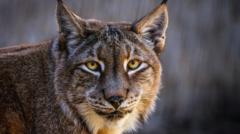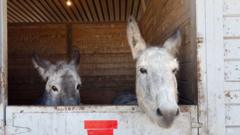The Aalborg Zoo in Denmark is making headlines for launching an unconventional initiative aimed at addressing the dietary needs of its predators. The zoo is appealing to the public to donate their healthy, unwanted pets, including live chickens, guinea pigs, and rabbits. The animals would be "gently euthanized" by trained staff, the zoo asserts, and this practice helps ensure its carnivorous residents receive a natural diet reminiscent of what they would hunt in the wild.
Prominent carnivores at the zoo include lions, tigers, and the Eurasian lynx, which benefits greatly from this program. The facility has positioned itself as caring for the animals' nutritional needs while also maintaining an ethical approach to handling unwanted pets. Furthermore, owners of live horses can donate, potentially receiving tax breaks under certain conditions. Horses must meet specific criteria, such as possessing a horse passport and being free from illness for at least 30 days.
Deputy Director Pia Nielsen highlighted that providing carnivores with a diet that includes fur and bones is essential for their health and wellbeing. She stated, "When keeping carnivores, it is necessary to provide them with meat... Therefore, it makes sense to allow animals that need to be euthanised for various reasons to be of use in this way.” Nielsen acknowledged that this approach is common in Denmark and that many community members appreciate the opportunity to participate.
Responses to the initiative may differ widely, with animal welfare advocates raising concerns over ethics and animal rights. Critics might argue the program trivializes the value of pets and poses ethical questions about the donation scheme. Conversely, supporters may emphasize the importance of natural diets for captive wildlife and the practical benefits of rehoming animals that are otherwise unwanted.
Aalborg Zoo's initiative embodies the intersection of animal welfare, conservation efforts, and public engagement, igniting discussions on the complexities of treating wildlife in captivity and how societal attitudes towards animal care continue to evolve.
Prominent carnivores at the zoo include lions, tigers, and the Eurasian lynx, which benefits greatly from this program. The facility has positioned itself as caring for the animals' nutritional needs while also maintaining an ethical approach to handling unwanted pets. Furthermore, owners of live horses can donate, potentially receiving tax breaks under certain conditions. Horses must meet specific criteria, such as possessing a horse passport and being free from illness for at least 30 days.
Deputy Director Pia Nielsen highlighted that providing carnivores with a diet that includes fur and bones is essential for their health and wellbeing. She stated, "When keeping carnivores, it is necessary to provide them with meat... Therefore, it makes sense to allow animals that need to be euthanised for various reasons to be of use in this way.” Nielsen acknowledged that this approach is common in Denmark and that many community members appreciate the opportunity to participate.
Responses to the initiative may differ widely, with animal welfare advocates raising concerns over ethics and animal rights. Critics might argue the program trivializes the value of pets and poses ethical questions about the donation scheme. Conversely, supporters may emphasize the importance of natural diets for captive wildlife and the practical benefits of rehoming animals that are otherwise unwanted.
Aalborg Zoo's initiative embodies the intersection of animal welfare, conservation efforts, and public engagement, igniting discussions on the complexities of treating wildlife in captivity and how societal attitudes towards animal care continue to evolve.








